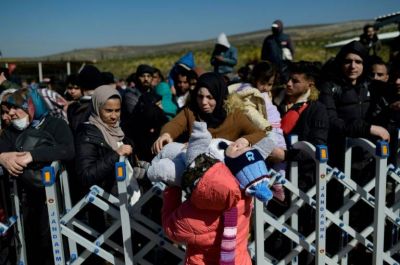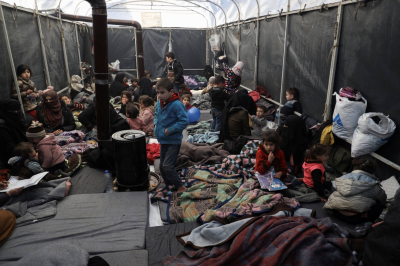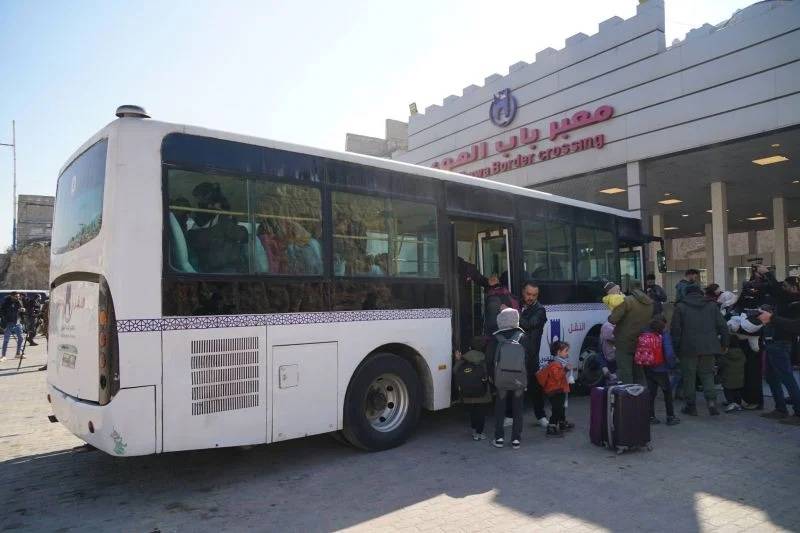
A bus carrying Syrians residing in Turkey arrives at the Bab al-Hawa border crossing on the Syrian side. (Credit: Moawia Atrash)
BAB AL-HAWA, Syria: On the Syrian side of the Bab al-Hawa border crossing with Turkey, dozens of Syrians arrive by bus back to their country of origin, luggage in hand.
Some of them are reunited with their loved ones, embracing them for the first time in years.
Fatima, 40, and her daughter, refugees from Homs who have been living in Turkey, have just arrived. Both are survivors of the devastating earthquake of Feb. 6, which, according to the most recent figures, killed more than 50,000 people in Turkey and neighboring Syria. Last week, Ankara allowed Syrians placed under “temporary protection” in one of the 11 Turkish provinces affected by the disaster to leave the country for up to six months.
“I am so sad. I have lost my loved ones. I feel completely alone,” Fatima says. Words fail her to describe the horror she experienced when the earthquake struck.
The quake of Feb. 6 and its aftershocks were a new trauma for these Syrians in Turkey, who were already marked by years of war and exile.
For two days, Fatima and her family were trapped under the rubble. One of her daughters was pulled out alive by the rescue workers, alongside her mother. Fatima's husband and other children did not survive.
“When they pulled them out, my daughter and I were passed out under the rubble. We woke up and screamed,” says the mother.
Since the Turkish announcement, more than 10,000 Syrians have returned to their homeland.
“There is no need for electronic booking. Every traveler can come directly to the crossing point during the official authorized period, from 9 a.m. to 5 p.m.," says Mazen Allouch, director of public relations and media at the Bab al-Hawa border crossing on the Syrian side.
"We are working to facilitate the return of Syrians returning from Turkey. Only those with identity cards from the earthquake-affected areas are allowed to enter," he adds.
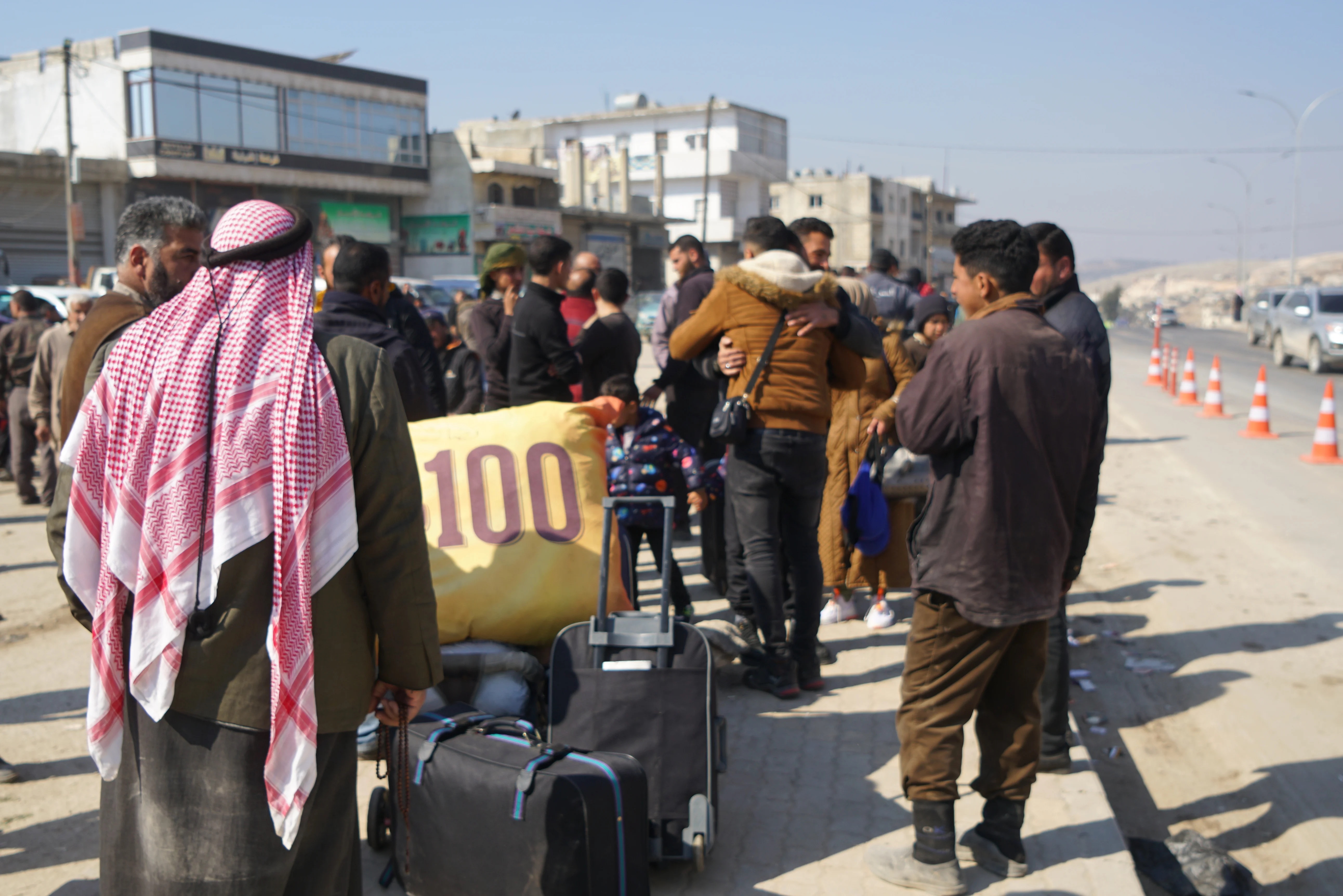 Relatives meet in Bab al-Hawa, on the Syrian side, after years of not seeing each other. (Credit: Moawia Atrash)
Relatives meet in Bab al-Hawa, on the Syrian side, after years of not seeing each other. (Credit: Moawia Atrash)
Going, sometimes with no plans of return
Some Syrians who cross the Turkish border plan to return to their host country, where nearly 3.4 million have sought refuge since a popular revolution in 2011 morphed into an increasingly bloody civil war.
Others are simply making the outward journey, with no plans for return.
“The situation in Turkey is very difficult, it is not possible to live there. I have no one left there, all my relatives are dead,” says Fatima, without news of other family members still under the rubble.
The 40-year-old contacted her brother to get her a tent so that she and her daughter could live with him in the Syrian town of Salkine, located in the countryside of western Idlib, which was also devastated by the earthquake.
Beyond the earthquake that pushes some Syrian refugees in Turkey to return there is also discrimination and hate speech, which also drives them back across the border.
“We are the targets of dangerous racism,” confides Abdul Rahman, from the southern countryside of Idlib. “Seven months ago, two of my friends were stabbed to death,” he says.
The earthquake has provided a new opportunity for Turkey’s far-right politicians and some of the population to attack Syrians, who are already blamed for Turkey’s economic crisis. Some of them have been blamed for alleged acts of looting and lynched by Turkish law enforcement officials. This situation, coupled with the difficult living conditions, calls into question the choice of those who had left everything to flee the war.
“I was in Turkey for three years working in a restaurant,” says Abdul Rahman, adding, “It is two years since I last returned to Syria because we were not allowed to cross the border if we wanted to come back.”
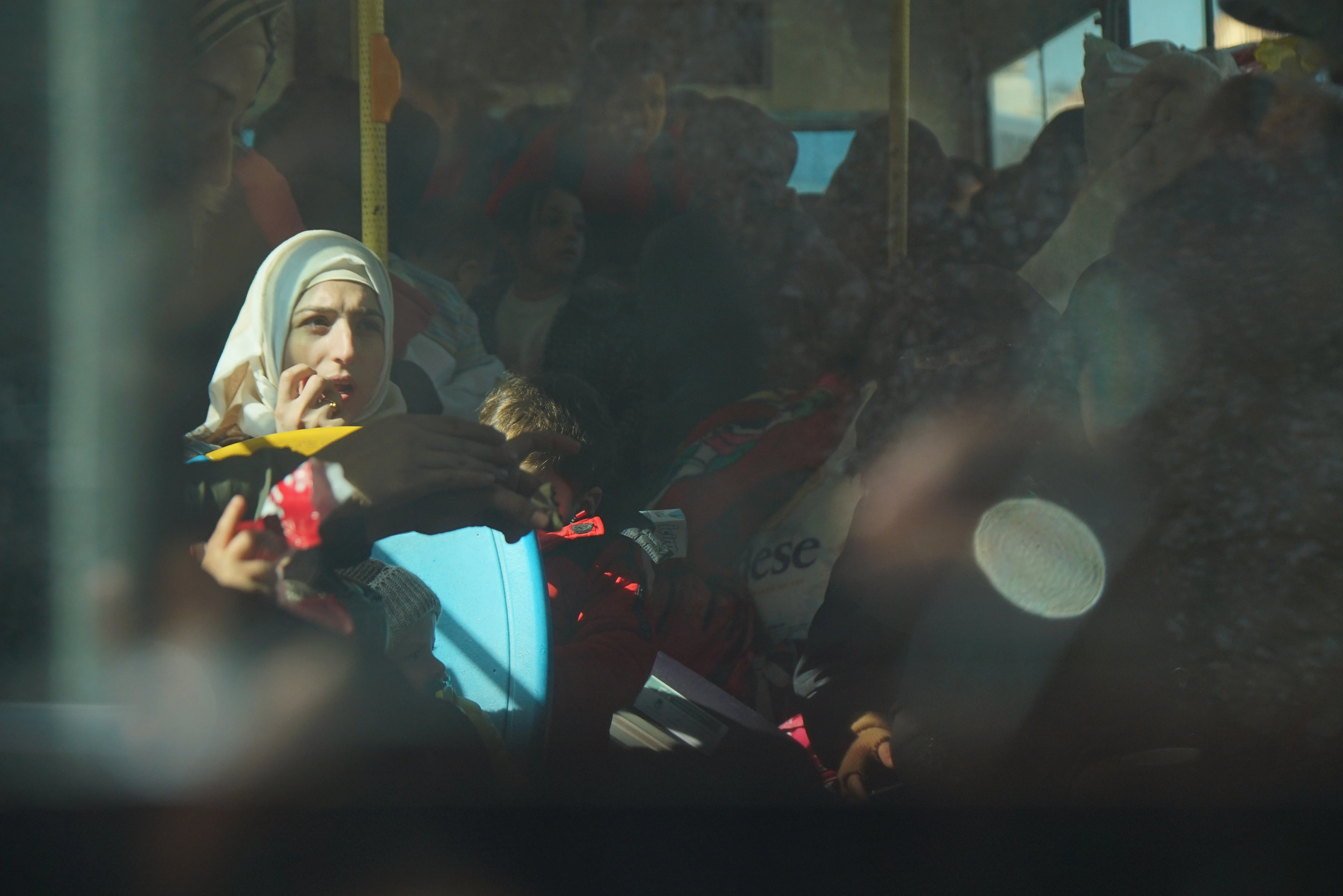 On the bus arriving from Turkey, Syrians who were previously not allowed to cross the border if they wanted to return to their country of residence. (Credit: Moawia Atrash)
On the bus arriving from Turkey, Syrians who were previously not allowed to cross the border if they wanted to return to their country of residence. (Credit: Moawia Atrash)
Allouch explains that “Syrians can now enter through four crossing points: Bab al-Hawa, Jarablus, Tall Abyad and Bab al-Salam.” He adds that “a stamp is placed [on the Syrian’s travel document] to know the date of entry and determine the date of return.”
Among these crossings, two are now open for the passage of humanitarian aid: Bab al-Hawa, which until recently was the only one for which the UN did not need authorization from the Syrian regime in order to deliver assistance to rebel areas in the north of the country, and Bab al-Salam, which was opened with al-Rai (Northeast) a week after the earthquake, after Damascus agreed to reopen these two border crossings to humanitarian aid for three months.
Raed, who returned to Syria in recent days and is originally from Damascus, will return to Antioch, where he lives, “when the effects of this disaster are over.” The young man was studying in his room when the ground began to shake on Feb. 6. After waking his family, they all rushed down the four floors of their apartment building.
“As we ran, the walls started to crack and the stones of the building fell, but it didn't completely collapse and we managed to escape into the street,” he recalls.
For nine days, they took refuge in a shelter in the Turkish city of Reyhanli before crossing the border to stay in the house of a relative in Syria.
While Raed expects to finish his studies in Antioch and then find a job there, he knows that many will not return. “Many Syrians don’t think about going back to Turkey, because they lost all their relatives and all their money there.”
This article was originally published in L'Orient-Le Jour.
